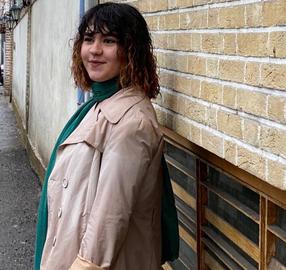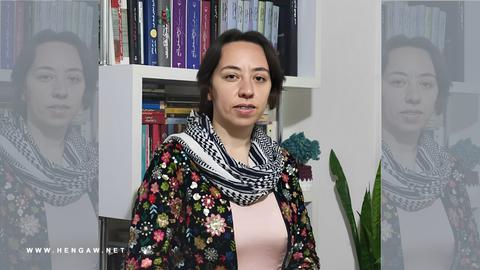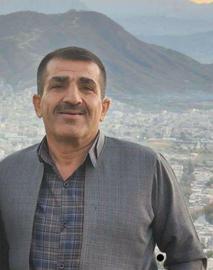Mahsa Vahdat, the distinguished Persian classical music vocalist, has a style inspired by old traditional and folk music of Iran that she developed for many years. It is the result of work with many musicians, both from Iran and from other countries. She writes most of her own songs but the lyrics mostly come from classical Persian poetry such as Hafez, Rumi and Khayyam, although she does not ignore the works of contemporary Persian poets.
Her unique style and her insight into poetry has opened new horizons in Iranian music, and she received favorable international attention.
Vahdat was born in Iran in October 1973. At 14 she started learning piano and then the Iranian string instrument setar. She studied traditional Persian singing under Pari Meleki and Mehdi Fallah. In 1993, she was accepted at Tehran University’s School of Arts and received a bachelor’s degree in music.
Vahdat started singing professionally in 1995 and since then she has performed concerts in various countries, many with her sister Marjan, and has participated in celebrated international music festivals, including the 2018 Oslo World Music festival in Norway. She believes that traditional Iranian music can cross borders and connect with other cultures.
After the 1979 Islamic Revolution, women were banned from singing solo in public, so most of Mahsa’s and Marjan’s albums are recorded outside Iran where she enjoys great fame within the Iranian diaspora and the fans of world music.
In Tehran, Vahdat holds music and singing classes for women in her home and has been recording the voice of talented young women whom she believes have a future in singing. She has contributed to the empowerment of women by encouraging them to give voice to their life. She has been a role model for many young Iranian female singers who live under the rule of a misogynic government that considers women's solo singing a taboo.
In 2004, Vahdat participated in Lullabies from the Axis of Evil, an album that collects traditional lullabies sung by women from Iraq, Iran and North Korea, as well as Syria, Libya, Cuba, Afghanistan and Palestine, mixed with Western performers singing translated versions of the songs.
After the release of this album, Vahdat started a long lasting collaboration with the Norwegian record label Kirkelig Kulturverksted (KKV) and the producer Erik Hillestad, which led to a worldwide release of a series of records.
In 2003, she was chosen as an ambassador of Freemuse, an independent international organization that advocates freedom of expression for musicians and composers worldwide. In 2010, she was granted the Freemuse Award.
Since 1995, Vahdat has performed as an independent artist in concerts and festivals in Asia, Europe, the US and Africa, together with acclaimed musicians from Iran, Europe and America such as Tord Gustavsen, Knut Reiersrud, Pasha Hanjani, Atabak Elyasi, Shervin Mohajer, Mathias Eick, SKRUK Choir and Mighty Sam McClain.
In 2007 she recorded "Songs from a Persian Garden" in a charity concert in the residence of the Italian ambassador in Tehran, and it was released in Norway and Europe and America. With her sister, she released in 2008 the “I Am Eve” album which has a strong message for women in Iran.
In 2011, their album “Twinkling of Hope” won the Independent Music Awards. And Bill Peduto, the mayor of Pittsburgh in Pennsylvania, declared September 6, 2019, “Mahsa Vahdat Day” to honor her advocacy of freedom of expression in music.
“From the time I remember, the political situation in my country had a big effect in my life and in my everyday life till now...so, of course, my art is also a reflection of these matters. But I cannot label myself a political artist. In general, I avoid labeling my art. Some people regard me a political artist and some not, it depends on the interpretation of the listeners and followers,” Mahsa said in an interview.
“For me, the true art has an element of being political. When it serves the freedom and brings transparency, it has element of being political. I can express my protest in my tones, in my expression, in the way of my singing… My presence on stage without a veil can be regarded as political. Even keeping the path of singing as an independent female singer can be regarded as political. But my main point is that my art does not serve a special agenda. It is beyond all these labels.
“It’s a tremendous sadness that women have been forbidden to freely sing in Iran, and for many talented artists at some point, the path became so challenging they had to give it up entirely. It’s brought a very sad feeling into Iranian society and has removed a certain tenderness from it. To prevent people from participating in one of their great cultural and human treasures is extremely sorrowful.
“However, the fact that this female vocal tradition has still been preserved in spite of these restrictions is incredibly inspiring; this proves that it’s impossible to keep some artists from pursuing their art, regardless of the consequences. In fact, many have chosen to walk their paths with even stronger conviction and dedication.
“I’ve personally suffered from injustice and have found the only thing I can do is continue to sing. Every tone is a protest, like the shedding of seeds that allow new plants to grow. I’ve always felt it’s so important that I stay true to this path, not only for myself, but so this art form can be preserved and passed down to future generations.”
visit the accountability section
In this section of Iran Wire, you can contact the officials and launch your campaign for various problems

























comments